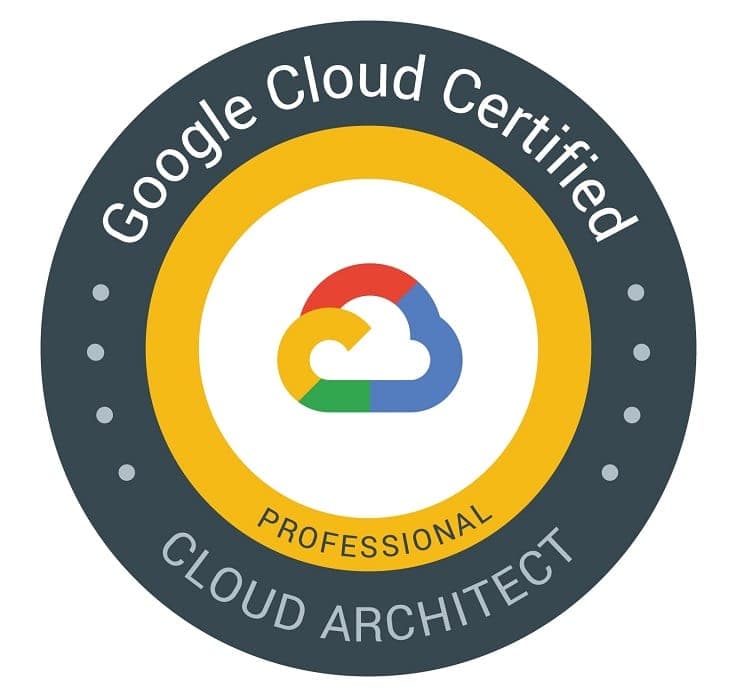Student Feedback
Professional Cloud Security Engineer Certification Video Training Course Outline
GCP Fundamental
Security at Google
Cloud Idntity
Create GCP Account
Managing cloud Identity
Resource Hierarchy
Cloud IAM
Service Accounts
VPC Fundamental Concepts
Sharing VPC&VPC Peering
Hybrid Network Connectivity
Some more Networking topics
Data Loss Prevention API
Data encryption at rest
Managing operations withing a cl...
GCP Fundamental
Professional Cloud Security Engineer Certification Video Training Course Info
Master Google Professional Cloud Security Engineer Exam – Full Course
Master Google Cloud (GCP) with 50+ Practical Labs and Gear Up for the Professional Cloud Security Engineer Exam
What you will learn from this course
• Understand how to secure applications and services inside Google Cloud Platform (GCP)
• Gain hands-on experience with various GCP security tools and services
• Learn to configure identity and access management (IAM) to protect cloud resources
• Understand how to manage network security including firewalls, VPCs, VPNs, and private connectivity
• Learn data protection techniques using encryption, Cloud Key Management, and Data Loss Prevention APIs
• Master incident response, monitoring, and compliance strategies in GCP
• Prepare thoroughly for the Professional Cloud Security Engineer certification exam
• Build strong foundational knowledge for advanced GCP certifications
Learning Objectives
The main objective of this course is to equip learners with the practical skills and knowledge necessary to secure cloud resources effectively. You will learn to implement security best practices across different layers of Google Cloud, including identity, network, and data protection. By the end of this course, learners will be able to:
• Configure and manage IAM policies and roles for projects, folders, and organizations
• Secure applications and services using GCP networking products such as VPC, firewall rules, Cloud VPN, and Cloud Interconnect
• Apply encryption to data at rest and in transit and manage cryptographic keys using Cloud Key Management Service
• Implement Data Loss Prevention strategies to detect and protect sensitive data in cloud storage and databases
• Monitor cloud resources, detect anomalies, and respond to security incidents using Security Command Center and related tools
• Understand regulatory compliance requirements and implement policies to meet them
• Gain confidence and readiness to pass the Professional Cloud Security Engineer certification exam
Target Audience
This course is designed for IT professionals, cloud engineers, security specialists, and anyone interested in building a career in cloud security using Google Cloud Platform. Ideal participants include:
• Professionals seeking to achieve the Google Cloud Professional Cloud Security Engineer certification
• Cloud administrators and engineers who want to strengthen their knowledge of cloud security
• Security analysts and IT managers responsible for securing cloud infrastructure
• Developers interested in integrating security best practices into cloud-native applications
• Individuals looking to advance their career by gaining practical, hands-on experience with GCP security tools
Requirements
To get the most out of this course, learners should have:
• Enthusiasm and commitment to learn GCP and cloud security concepts
• A Google Cloud account with a valid debit or credit card to access cloud services
• Basic understanding of cloud computing concepts and general IT knowledge
• Access to a computer capable of running web browsers and connecting to Google Cloud Console
Prerequisites
Before starting this course, it is recommended that learners have:
• Familiarity with general networking concepts such as IP addressing, routing, and firewalls
• Basic understanding of Linux or Windows operating systems
• Some experience with managing cloud resources, though this course also caters to beginners
• Awareness of security fundamentals including authentication, authorization, encryption, and compliance standards
Description
Google Cloud Platform has rapidly become one of the leading public cloud providers worldwide. Organizations of all sizes rely on GCP to host applications, store sensitive data, and manage workloads in a secure and scalable environment. With this growth, securing cloud resources has become a critical priority. The Professional Cloud Security Engineer certification is designed to validate an individual’s ability to design, implement, and manage security strategies within GCP.
This course is structured to provide a blend of theoretical knowledge and practical, hands-on experience. The focus is on real-world applications and scenarios that a cloud security engineer would encounter daily. By emphasizing practical exercises, learners gain the confidence to apply security concepts directly within Google Cloud.
Security in GCP spans multiple domains, including identity management, network security, data protection, operations, and compliance. Understanding these domains is crucial for anyone preparing for the Professional Cloud Security Engineer certification. This course begins with foundational topics and progressively builds up to more advanced concepts, ensuring a comprehensive learning experience.
Configuring Access in Google Cloud
A strong foundation in identity and access management is essential for securing cloud resources. IAM allows organizations to define who can access specific resources and what actions they are allowed to perform. This module covers the setup of Cloud Identity, management of user roles, service accounts, and the organization’s resource hierarchy, including projects and folders.
Learners will practice creating and assigning IAM roles, configuring service accounts for applications, and managing permissions to ensure that only authorized users can access sensitive resources. Understanding how to implement the principle of least privilege is emphasized throughout the exercises, as this is a core security best practice.
Networking Security Fundamentals
Securing network traffic is another critical component of cloud security. This module introduces Google Cloud networking products and demonstrates how to configure them for enhanced security. Topics include Virtual Private Cloud (VPC) setup, firewall rules, subnets, static and internal IP management, hybrid connectivity, Cloud VPN, and Cloud Interconnect.
Learners will gain hands-on experience creating secure network architectures, isolating resources, and configuring private access to Google APIs. The course also demonstrates how to integrate Identity-Aware Proxy (IAP) for secure application access and hybrid connectivity to extend on-premises security policies into the cloud.
Data Protection Strategies
Data security is a top priority in cloud environments. This module focuses on protecting sensitive information using encryption and Data Loss Prevention (DLP) strategies. Learners will explore how to encrypt data at rest and in transit, manage cryptographic keys with Cloud Key Management Service, and use DLP APIs to detect and protect sensitive data stored in cloud resources.
Hands-on exercises include creating and managing encryption keys, implementing data classification policies, and applying DLP techniques to cloud storage and databases. These skills ensure that learners are prepared to protect critical data against unauthorized access and potential breaches.
Managing Operations and Compliance
Operational security involves monitoring cloud resources, detecting anomalies, and responding to incidents. This module introduces tools and techniques for managing operations securely, including Security Command Center, logging, alerting, and incident response strategies.
Learners will also explore compliance management, including best practices for data backup, recovery objectives (RTO and RPO), container security, web security, and policy enforcement. Emphasis is placed on aligning operational processes with security and compliance requirements to ensure a robust cloud security posture.
Hands-On Labs
Practical experience is essential for mastering cloud security. This course includes over 50 hands-on labs covering IAM, networking, data protection, monitoring, and compliance tools in GCP. Labs are designed to simulate real-world scenarios, allowing learners to apply security configurations, test policies, and troubleshoot issues in a controlled environment.
The hands-on approach ensures that learners are not only familiar with theoretical concepts but also competent in implementing them in practice. This method greatly enhances readiness for the Professional Cloud Security Engineer certification exam and real-world job responsibilities.
Course Modules / Sections
This course is divided into multiple modules to provide a step-by-step understanding of securing cloud resources within Google Cloud Platform. Each module focuses on a specific aspect of cloud security and combines theoretical explanations with hands-on labs for practical experience.
The first module introduces the fundamentals of identity and access management, covering roles, permissions, and resource hierarchy in GCP. Learners will gain a solid foundation in configuring Cloud Identity, creating service accounts, and managing organization-level policies.
The second module focuses on networking security, guiding learners through the setup of Virtual Private Cloud (VPC), firewall rules, subnets, and hybrid connectivity. Topics such as Cloud VPN, Cloud Interconnect, private access to Google APIs, and Identity-Aware Proxy (IAP) are covered in detail to ensure learners understand how to secure network traffic and resources.
The third module emphasizes data protection strategies. Learners will explore encryption for data at rest and in transit, management of cryptographic keys with Cloud Key Management Service (KMS), and implementation of Data Loss Prevention (DLP) policies. Practical exercises will focus on applying encryption to storage, databases, and applications.
The fourth module introduces operational security and compliance, including incident response, monitoring, logging, and security policy enforcement. Learners will also study container security, web application security, and best practices for implementing organizational policies to meet regulatory compliance standards.
The fifth module integrates advanced topics, focusing on securing applications, workloads, and services at scale. Learners will work on scenario-based labs to simulate real-world challenges and implement end-to-end security solutions using GCP tools.
The sixth module covers exam preparation, including review of all major concepts, hands-on exercises aligned with exam objectives, and practice quizzes. Learners will have the opportunity to consolidate their knowledge and gain confidence in their ability to pass the Professional Cloud Security Engineer certification exam.
Key Topics Covered
This course provides comprehensive coverage of all topics essential for securing cloud resources in GCP. The key topics include:
Identity and Access Management
Learners will explore IAM policies, roles, and permissions, focusing on best practices to implement least privilege access. Topics include configuring Cloud Identity, managing service accounts, and understanding resource hierarchy, including organizations, projects, and folders. Hands-on exercises involve creating and assigning IAM roles, setting up custom roles, and managing permissions for users and groups.
Networking Security
Networking is a critical area of cloud security, and this course covers all aspects required to secure GCP network resources. Learners will configure VPCs, subnets, firewall rules, internal and external IPs, and hybrid connectivity options such as Cloud VPN and Cloud Interconnect. Identity-Aware Proxy is explored to control access to web applications, and private access to Google APIs is demonstrated. Learners will perform practical exercises to configure secure network architectures and test connectivity and access controls.
Data Protection
Data security forms the core of cloud security responsibilities. Learners will gain hands-on experience with encryption mechanisms for data at rest and in transit. Cloud Key Management Service (KMS) will be used to manage encryption keys securely. Data Loss Prevention (DLP) API will be applied to identify and protect sensitive information stored in cloud storage, databases, and applications. Practical labs include implementing encryption strategies, creating and managing keys, and deploying DLP templates for real-world scenarios.
Operational Security
Monitoring, logging, and incident response are vital for maintaining a secure cloud environment. Learners will use Security Command Center, Cloud Logging, Cloud Monitoring, and Alerting to detect anomalies and respond to security incidents. Additional topics include audit logging, alert configuration, and workflow automation for incident response. Container security, web application security, and binary authorization are explored to demonstrate best practices for protecting workloads and applications in GCP.
Compliance
Regulatory compliance is a major consideration for organizations using cloud infrastructure. Learners will study industry standards and regulations, including GDPR, HIPAA, and ISO compliance frameworks. Techniques for implementing policies to ensure compliance and governance within GCP are covered. Labs include configuring compliance dashboards, policy enforcement, and auditing access and security controls across cloud resources.
Application and Workload Security
This module covers securing applications and workloads at scale. Topics include managing secrets, securing APIs, implementing network segmentation, and applying security policies to virtual machines and containers. Learners will practice designing and implementing end-to-end security solutions for various cloud applications and services.
Exam Preparation
The final module prepares learners for the Professional Cloud Security Engineer exam. Topics are reviewed in depth, hands-on exercises are repeated to reinforce learning, and learners take practice quizzes covering all exam objectives. Guidance on exam strategies, time management, and key areas of focus ensures learners are fully prepared to succeed.
Teaching Methodology
This course follows a highly practical, hands-on teaching methodology. The approach combines theoretical explanations with extensive lab exercises to ensure learners can apply concepts in real-world scenarios.
Video Lessons
All course content is delivered through high-quality HD video lessons, providing clear explanations of concepts, step-by-step demonstrations, and real-world examples. Each video is structured to build upon previous concepts, ensuring a progressive learning path.
Hands-On Labs
Hands-on exercises form the backbone of the course. Learners work directly in Google Cloud Console, applying security configurations, testing network settings, encrypting data, and implementing operational policies. Over 50 labs cover IAM, networking, encryption, monitoring, compliance, and workload security. These labs simulate real-world cloud security challenges, enabling learners to gain practical experience that goes beyond theoretical knowledge.
Scenario-Based Learning
Scenario-based exercises are integrated throughout the course to help learners understand how to apply concepts in realistic environments. Scenarios include securing multi-project architectures, configuring hybrid connectivity, protecting sensitive data, and responding to incidents. Learners gain the ability to make security decisions under conditions similar to those faced by professional cloud security engineers.
Quizzes and Knowledge Checks
To reinforce learning, quizzes are included at the end of each module. These quizzes test understanding of key concepts, IAM policies, network configurations, data protection strategies, and operational security practices. Knowledge checks help learners identify areas that require further study and improve retention of material.
Minimal Slides, Maximum Practice
The course minimizes reliance on slides and focuses on practical demonstrations and exercises in the Google Cloud environment. Learners spend the majority of their time working directly with cloud resources, gaining real experience with security tools and techniques.
Guided Instructions
Each lab and demonstration is accompanied by detailed, step-by-step guidance. Learners are encouraged to follow along, replicate the exercises, and explore additional configurations to deepen their understanding.
Instructor Support
Dedicated Q&A sessions and support channels are available to address learner questions, provide clarification, and assist with lab exercises. Learners receive guidance on best practices, troubleshooting, and applying security concepts effectively.
Assessment & Evaluation
Assessment and evaluation in this course are designed to ensure learners gain competence and confidence in applying GCP security practices.
Module Quizzes
At the end of each module, learners complete quizzes that cover the major concepts introduced in the lessons. These quizzes test knowledge of IAM, network security, data protection, operational security, and compliance. They provide immediate feedback and explanations for incorrect answers to reinforce understanding.
Hands-On Lab Evaluation
Each hands-on lab includes practical exercises with clearly defined objectives. Learners are assessed on their ability to implement security configurations, manage cloud resources, and apply best practices effectively. Lab exercises simulate real-world scenarios, allowing learners to demonstrate their skills in realistic environments.
Scenario-Based Assessments
Scenario-based assessments are incorporated to evaluate learners’ ability to apply multiple concepts simultaneously. Scenarios may involve securing a multi-project environment, responding to a simulated security incident, or implementing data protection policies across various cloud services. Learners are evaluated based on accuracy, completeness, and adherence to security best practices.
Progress Tracking
Learners can track their progress through the course using completion metrics for modules, labs, and quizzes. This tracking helps identify areas that require further attention and ensures that learners cover all exam-relevant topics comprehensively.
Exam Readiness Evaluation
The course includes practice questions and mock exercises aligned with the Professional Cloud Security Engineer exam objectives. Learners can evaluate their readiness for the certification exam by completing these exercises under timed conditions, simulating the exam environment.
Continuous Improvement
Feedback from assessments, quizzes, and lab exercises allows learners to identify strengths and areas for improvement. The course provides opportunities to revisit topics, repeat labs, and review key concepts to ensure mastery before attempting the certification exam.
Comprehensive Skill Development
By combining theoretical knowledge, hands-on practice, scenario-based exercises, and assessment evaluations, learners develop a complete skill set required for professional cloud security engineering. The course ensures that learners are not only prepared for the exam but also capable of implementing security practices effectively in real-world Google Cloud environments.
Benefits of the Course
This course provides numerous benefits for learners looking to build a career in cloud security with Google Cloud Platform. Participants gain a thorough understanding of cloud security principles, tools, and best practices, preparing them to secure applications, data, and infrastructure within GCP. By the end of this course, learners will be able to design, implement, and manage security solutions across multiple cloud environments, ensuring compliance, operational efficiency, and data protection.
The hands-on approach ensures that learners not only understand concepts theoretically but can also apply them practically. With over 50 lab exercises, participants gain experience in real-world scenarios, making them job-ready and capable of handling security responsibilities immediately. The course helps build confidence in using GCP security tools, managing IAM policies, securing network traffic, implementing encryption, and monitoring cloud environments for potential threats.
Another key benefit is alignment with the Professional Cloud Security Engineer certification objectives. Completing this course significantly increases the likelihood of passing the certification exam by providing in-depth coverage of all required topics. Learners also develop transferable skills that are applicable across other cloud platforms, giving them versatility and enhancing their career growth opportunities.
This course also emphasizes professional development. Google Cloud certified individuals often experience increased confidence in their skills, take on more responsibilities at work, and are recognized for their expertise in cloud security. The combination of theory, practical labs, and scenario-based learning ensures that participants gain both knowledge and the ability to apply it effectively.
The course is suitable for beginners and experienced professionals alike. For beginners, it provides a structured approach to understanding GCP security from the ground up. For experienced professionals, it enhances existing skills, updates knowledge on the latest GCP security products, and reinforces best practices for securing complex cloud environments.
Course Duration
The total duration of the course is approximately 12 hours of high-definition video content. Lessons are structured in a modular format, allowing learners to progress at their own pace. Each module ranges from 30 minutes to 2 hours, depending on the complexity of the topic and the number of hands-on labs included.
Hands-on lab exercises are included in every module, adding practical experience to complement theoretical lessons. The 50+ labs are designed to be completed alongside video instruction, and each lab typically takes between 10 and 30 minutes to complete. Learners can repeat labs as needed to reinforce understanding and build confidence in applying security concepts.
The course is designed to be flexible. Participants can choose to complete it over a few days, a couple of weeks, or spread it over a month, depending on their schedule. The modular approach allows learners to focus on specific topics, revisit complex sections, and practice hands-on labs multiple times without being constrained by a fixed timeline.
The video lessons are recorded in HD quality with clear explanations, demonstrations, and examples. Each lesson is structured to progressively build knowledge and skills, ensuring that learners grasp fundamental concepts before moving on to more advanced topics. Quizzes and knowledge checks are embedded within modules to evaluate comprehension and provide immediate feedback.
Lifetime access to all course content ensures that learners can revisit lessons and labs at any time. This allows participants to refresh their knowledge, explore updates to GCP security tools, and stay current with best practices even after completing the course.
Tools & Resources Required
To gain the full benefit of this course, learners will need a few essential tools and resources. The primary requirement is a Google Cloud Platform account. A GCP account with a valid debit or credit card is necessary to access services and complete hands-on labs. Free-tier options are available for some services, but learners may need to enable billing for advanced labs or extended usage.
Access to a computer or laptop with a reliable internet connection is required. The course is designed to be completed using a web browser, so learners should ensure that their system supports Google Cloud Console, video streaming, and lab exercises efficiently. Recommended browsers include Google Chrome, Mozilla Firefox, or Microsoft Edge.
Learners will also benefit from basic familiarity with cloud computing concepts, networking principles, and operating systems such as Linux or Windows. While the course provides guidance for beginners, prior knowledge can accelerate understanding and application of security concepts.
The course includes downloadable resources such as lab guides, templates, and reference materials. These resources provide additional context, step-by-step instructions, and examples to reinforce learning. Learners are encouraged to follow along with these resources during labs to maximize practical experience.
For hands-on exercises, learners will interact directly with Google Cloud services including IAM, VPC, Cloud VPN, Cloud Interconnect, Cloud Key Management Service, Data Loss Prevention API, Security Command Center, Cloud Logging, Cloud Monitoring, and related tools. Familiarity with these services is developed progressively through guided instruction and lab exercises.
Quizzes and practice exercises are provided online and require no additional software. Learners simply need access to the course platform to complete assessments and track progress. The combination of video instruction, labs, and practice assessments ensures that learners gain a complete understanding of cloud security concepts and hands-on experience necessary for certification and professional application.
Participants may also use optional resources such as community forums, study groups, and official Google Cloud documentation to supplement learning. These additional resources can provide insights, tips, and solutions to challenges encountered during labs or while preparing for certification exams.
The course is designed to minimize dependence on external tools beyond Google Cloud and standard computing requirements, allowing learners to focus on practical experience and concept mastery without unnecessary technical barriers.
Career Opportunities
Completing this Professional Cloud Security Engineer course opens up a wide range of career opportunities in the rapidly growing cloud industry. With organizations increasingly moving workloads, applications, and sensitive data to Google Cloud Platform, demand for skilled cloud security professionals continues to rise.
Certified individuals are qualified to work in roles such as cloud security engineer, cloud solutions architect, cloud administrator, security analyst, and compliance officer. These roles involve securing applications, designing and implementing access controls, protecting data at rest and in transit, and managing cloud infrastructure to meet industry security standards. Professionals in these positions are often responsible for configuring and monitoring IAM policies, securing networking components, and implementing encryption and data loss prevention strategies.
Many organizations also seek cloud security engineers to handle incident response, threat detection, and compliance management. Google Cloud certified security professionals often work in teams that develop and maintain secure cloud environments for enterprises, government agencies, and technology companies. The ability to manage operational security, monitor cloud activity, and enforce policies makes these professionals essential for maintaining secure, resilient, and compliant cloud operations.
Beyond technical roles, certification can lead to leadership and management opportunities. Many cloud-certified professionals are recognized for their expertise and promoted to lead cloud security teams, manage projects, or advise on security strategy at the organizational level. The skills gained in this course are not only applicable to GCP but are transferable to other cloud platforms, making learners versatile and in demand across multiple environments.
In addition, cloud security expertise can open up opportunities in consulting, freelance projects, and advisory roles. Organizations frequently require guidance on secure cloud adoption, migration strategies, and regulatory compliance, creating avenues for certified professionals to provide expert services.
Overall, completing this course and achieving Google Cloud Professional Cloud Security Engineer certification positions learners as highly skilled, competitive candidates in a fast-growing field. The combination of practical skills, theoretical knowledge, and certification recognition significantly enhances employability and career growth potential.
Conclusion
This course provides a comprehensive pathway to mastering cloud security on Google Cloud Platform. Participants gain foundational and advanced knowledge in identity and access management, network security, data protection, operational security, compliance, and application workload protection. With over 50 hands-on labs, learners gain practical experience replicating real-world scenarios, preparing them to handle cloud security challenges confidently.
The structured modules cover all critical aspects of cloud security, ensuring alignment with the Professional Cloud Security Engineer certification objectives. Learners progress from basic IAM configuration to advanced network security, encryption, incident response, and compliance management. Each topic is reinforced through practical exercises, scenario-based learning, quizzes, and guided demonstrations, creating a highly engaging and effective learning experience.
Beyond exam preparation, this course equips learners with skills that are directly applicable in professional settings. The ability to secure cloud infrastructure, protect data, implement operational policies, and monitor cloud environments ensures that participants are job-ready and capable of contributing immediately to organizational security goals. Certification validates expertise and enhances credibility, opening doors to advanced roles and leadership opportunities.
The career benefits of completing this course include increased confidence, enhanced technical skills, and opportunities for promotion or role expansion. Cloud security professionals are in high demand, and Google Cloud certification is recognized globally as a benchmark for competency and expertise in securing cloud platforms. Learners who complete this course gain a competitive edge, demonstrating both practical skills and theoretical understanding.
This course is also highly flexible, allowing participants to learn at their own pace, revisit labs, and apply knowledge in real-world environments. Lifetime access to course content ensures that learners can stay up-to-date with new developments in Google Cloud security and refresh their skills whenever needed. The combination of comprehensive coverage, practical labs, and certification alignment ensures that participants are fully prepared to meet the demands of modern cloud security roles.
By investing time in this course, learners are making a strategic decision to build expertise in one of the fastest-growing fields in technology. Cloud security is critical to organizational success, and professionals who can implement robust security measures, manage access controls, protect sensitive data, and respond to incidents are highly valued. This course provides the knowledge, practical skills, and certification readiness required to excel in this field and advance in a cloud-focused career.
Enroll Today
Start your journey to becoming a Google Cloud Professional Cloud Security Engineer today. With structured modules, 50+ hands-on labs, quizzes, and guided instruction, this course provides everything you need to gain expertise in cloud security. Prepare for the certification exam, enhance your career opportunities, and become a confident, skilled cloud security professional. Enroll now and take the next step in building a successful career in Google Cloud security.













